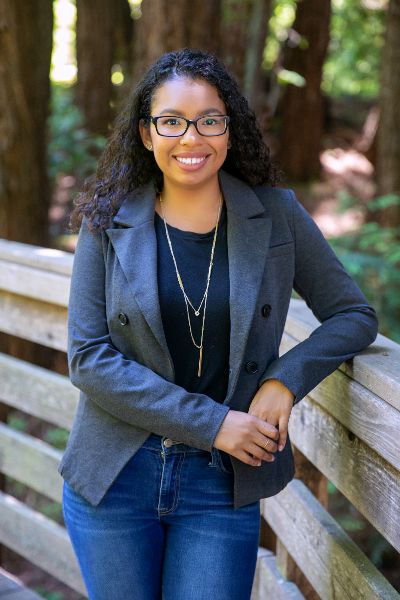Campus News
Building bridges out of prison walls
Student Alyssa Tamboura began a student-run, volunteer program called Walls to Bridges that mediates meetings between those jailed and their families as a way to work their way back to better relationships.

Alyssa Tamboura’s father went to prison when she was 9 years old, and, for 10 of the 13 years he was behind bars, she blamed him for abandoning her to what she said was life in an abusive household where she eventually dropped out of high school and landed on the streets. She was filled with rage toward him.
She could have stayed angry. She could have done nothing. Instead, the 26-year-old legal studies and philosophy major at UC Santa Cruz started a project designed to help families touched by incarceration heal from the same issues of hurt and anger she experienced. Called Walls to Bridges, the student-run, volunteer program relies on mediated meetings between those jailed and their families as a way to work their way back to better relationships. It was funded with a $15,000 grant from the Donald A. Strauss Foundation and won a Rudd Family Foundation Big Ideas award through UC Berkeley. Its team is doing remote mediations until pandemic restrictions ease.
“The rupturing of relationships that occurs with a prison sentence, the pain and grief and anger that continues to radiate out from this—these are devastating issues, but they are largely ignored by the outside world,” said Elizabeth Beaumont, associate politics professor at UC Santa Cruz and one of Tamboura’s mentors. “So, Alyssa’s work to address the hidden tragedy of families riven by incarceration, to create bridges within families, and bridges from those within prison to the world outside, is absolutely vital.”
Tamboura described her home life after her father left as a troubled one. There were substance abuse issues, she said, and, after she was thrown out of the house, she was forced to couch surf or sleep in cars. Pregnant at 16, she dropped out of high school and gave birth to a son. She had no contact with her father, who was first in California State Prison, Corcoran, and then San Quentin State Prison.
“I was so angry at my dad for what felt like him abandoning me,” she said.
At 19, and now a single mom, she decided she was going to confront her father. She spent the whole drive to San Quentin imagining how she would lay into him, reciting a litany of what he’d done wrong and how much he hurt her.
“And then he comes into the visiting room,” she said by phone. “He stops, looks at me, and gives me a big hug. I start crying and he says, ‘I’m so sorry that I left you.’ My father took responsibility for how his incarceration caused conflict in our relationship.”
It changed everything. They began to talk.
At 20, Tamboura was back at San Quentin, this time to witness her father graduate with a two-year associate’s degree and as valedictorian of his small class. She thought, “if my dad in prison could do it, get an education, so could I.”
Tamboura received her GED, found a job as an administrative assistant at Stanford Medical School, and enrolled in Foothill Community College while also raising her son. When she came to UC Santa Cruz, she said, she thought she’d found a place “where I could finally pursue my dreams, be myself and breathe.”
It was there, in 2018, that Beaumont, her professor, offered students in her civil liberties course extra credit for attending a restorative justice forum at the Resource Center for Nonviolence in downtown Santa Cruz.
Restorative justice involves a meeting—often mediated—between a victim and perpetrator in which experiences are shared and they come to a consensus of what can be done to repair the damage caused. After the forum was over, Tamboura thought, “Wow, this is such a great process of bringing two people together to talk about any harm or conflict in their relationship and find a way to resolve it. I thought it would be beneficial to start a project so people impacted by incarceration could have access to this healing.”
She applied for and got the $15,000 grant, found and set up training for volunteers, received support from the Conflict Resolution Center Santa Cruz, and started to recruit families when the COVID-19 pandemic stalled the project. She is now preparing a written “toolkit” of procedures and processes to run the program so that when she graduates in 2021 with her College Ten classmates, someone else can take the program’s reins.
“Alyssa is a force of nature,” Beaumont said. “I really don’t know how she does it all—a star student, a devoted single mother, and a visionary leader for this project. And on top of it all, she’s also such a warm and generous friend. Certainly, part of the magic is that she’s tremendously smart, with so much curiosity. And she doesn’t just dive into learning inside the classroom, but she carries it back and forth beyond these walls.”
Tamboura, she added, “contributes to a remarkable tradition of courageous and impactful student activism at UC Santa Cruz.”
Tamboura, whose son, Christopher, is now 9, also wrote and is publishing a children’s book about visiting a parent in prison; recently won the Phi Beta Kappa’s Key into Public Service national scholarship; was awarded UC Santa Cruz’s Gabriel Zimmerman Scholarship last year; and plans to go to law school after she graduates.
“Everything I’ve been through has led me to this moment,” Tamboura said, “and, in this moment, I see that I am now in a position to help people who are suffering the way I was suffering.”